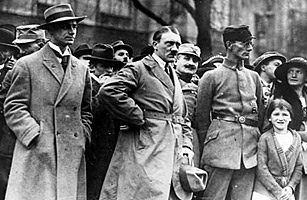
Nov. 8, 1923
The man with the square moustache jumped onto a table and fired a shot into the ceiling of the Buergerbräukeller, a large beer hall in Munich.
"The national revolution has begun," he shouted. Not quite. Adolf Hitler was forcing the issue. With Germany seething at the spineless Weimar government over the humiliating terms of the World War I armistice, Hitler sensed an opportunity. Just before 9 p.m., his Nazis launched a putsch, or coup d'état, taking three powerful officials hostage. With hundreds of his Storm Troopers surrounding the hall, he compelled the trio to support him.
But Nazi euphoria was fleeting; Hitler's three "supporters" slipped away and denounced him. Police opened fire on the Nazis when they took to the streets the next day. Hitler was arrested. The putsch was a joke. But at his trial, Hitler beguiled the populace with orations for restoring German greatness. After serving only eight months of a five-year sentence, he emerged from jail with the first part of his seminal work of Nazism, Mein Kampf. The joke would have a devastating punch line.